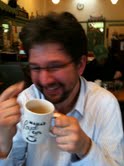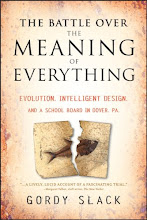 | ||
| Whose names were writ in water. |
The last day of a good conference is a little sad. The orphaned sessions are under attended and the presenters make self-deprecating quips about their tiny audiences. Posters are coming down and the booths set up by pharmaceutical
companies and medical publishers and manufacturers of vegus nerve implants,
intracranial monitoring electrodes, deep-brain stimulators and new super-sensitive EEG machines are
all being disassembled and carted out. Most delegates have snuck out early to
explore the Vatican or the Coliseum, or to hit the tony boutiques on Via
Corsa, or to eat some of the best food on Earth.
It's a special breed that stays to the bitter end. And of those who stayed to the end of the 29th International Epilepsy Congress, many had also shut down IEP meetings past. Tanya
Spensley, for example, has been to at least half a dozen, she told me,
including those in Singapore, Paris, Budapest, and Lisbon. And she is already
looking forward to the 30th IEC in Montreal in 2013.
Spensley is a good example of the many remarkable activists
I met at the IEC who dedicate themselves to making life better for people with
epilepsy. She is a Londoner, and active in her local epilepsy group there, but
for several years she has also been going to Gambia, in Africa, organizing to
bring medication and epilepsy education to a country of 1.7 million people that
has not a single EEG machine, where people with epilepsy are thought to be
contagious and are shunned, unmarriageable, and often get no medical treatment
at all.
“I often wish I could show my friends in the UK--who whinge about
having to wait for service or the inconvenience of the healthcare system--what
it’s like in Gambia, where some lucky families have to travel for days just to
get medication they can just barely afford.”
The difference between the treatment of epilepsy in the
developed and undeveloped worlds is not really a “gap.” It’s a chasm!
And Spensley is dedicated to bridging that chasm the best a
single smart and dedicated person can. Quixotic? Perhaps. Heroic? Absolutely!
If you’re trying to reduce the suffering of people with epilepsy, you can get a
huge bang for your buck in places like Gambia. Delivering the most basic AEDs
to those who are responsive to them can, for a few dollars a month, turn a
difficult and convulsive life into a much easier one free of seizures. It is
low-hanging and excellent fruit; not exactly easy to pick, but ripe and ready
for those who want to contribute time and/or money. To contact Spensley, look
at her website www.epilepsyfootprint.com
When the Congress finally wound down and the organizers and
IEC officers were shaking hands and hugging goodbye, my friend took me to an
old and beautiful graveyard in the Ostiense district of Rome. The great
English poet Keats, who died in
Rome of tuberculosis at 25, is buried there. It is a poignant place: beautiful
but full of loss. Keats’s death was so much more that a personal tragedy. It
was a loss for the world.
How many other talented and beautiful young people with
unique and penetrating insights, too, die before their time? Thousands each
year are taken by their epilepsy in the developed world alone. In developing
countries, any guess at a number would be a wild one--these young men and women
are not even counted--but it must be in the tens or hundreds of thousands.
For whatever reasons, Yeats, broken and bitter at the end of
his short life, wanted an anonymous place to rest and, believing he would soon
be forgotten, he asked that his grave bear this inscription: “Here lies one
whose name was writ in water.” Ironic, perhaps, that since his death nearly two
centuries ago, his name has been writ in water again and again by the tears of
sentimental admirers who pilgrim there.
How many unrecognized poets, and artists, and engineers, and
gentle or ferocious souls of all kinds, whose lives might have been spared with
a little medication or understanding from their communities or families, or attention
from a doctor, lie instead in unmarked, and unmourned, graves around the world? Yes, the end of a good conference is always a little sad.


No comments:
Post a Comment